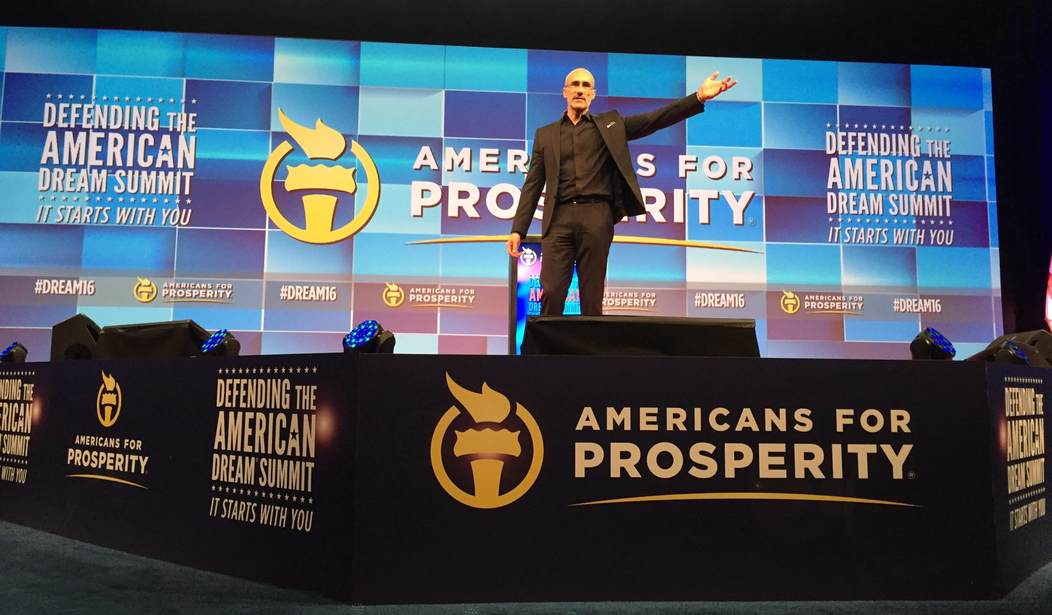ORLANDO, FL — One of the most electrifying speakers at a conference for conservative political activists insisted that liberals are not stupid or evil. Don’t misunderstand — he still said liberals were wrong, but he called on conservatives to replace their political contempt with gratitude and to answer anger with kindness.
He recalled a lady “talking about how liberals are stupid and evil. You know what I was thinking? She’s talking about my family in Seattle, and I resent that! They’re not right politically — you are! — but they’re not stupid and they’re not evil,” declared Arthur Brooks, president of the American Enterprise Institute (AEI). “It’s not helpful, and I don’t like it when we talk about each other that way, and it’s time to stop!”
Liberals are not stupid and they're not evil. When you say that, I think of my family. @arthurbrooks #Dream16 #tcot pic.twitter.com/a3CNwkzT0I
— Tyler O'Neil (@Tyler2ONeil) September 2, 2016
Brooks argued that the problem behind America’s painful political polarization isn’t anger — it’s contempt. Conservatives and liberals don’t just think their political enemies are wrong, they think they’re evil. This is not a civil or a Christian way of treating one another, and it’s not fitting for a great nation like America.
But the president of AEI was addressing the “Defending the American Dream” Summit, an event put on by Americans for Prosperity (AFP), which boasts the largest grassroots network on the right. He had to acknowledge the evils conservatives fight against, and acknowledge them he did.
Contempt is a very understandable emotion for conservatives to have. “I feel it all the time,” Brooks acknowledged. “Every night, I dream about some new terrible policy of the Obama administration, and every morning I open The Washington Post and what they did is actually worse than my dream. I feel contempt, and there’s a lot of contempt flying around between people on the right.”
Brooks asked the Dalai Lama what he does when he feels contempt, and the Buddhist leader said, “Substitute it with kindness.”
“Sounds kind of soft, right? No, no. Kindness isn’t for sissies,” Brooks declared. “Kindness is for tough people, and it’s magic.” To demonstrate this point, he recalled the publication of his first commercial book, Who Really Cares: The Surprising Truth About Compassionate Conservatism. The book argued that conservatives give more to charity than liberals, and it took off.
One day, the author received a hateful email attacking his book. But as he read the email, he realized that this reader had gone point by point throughout the book, responding to every claim in detail. Rather than responding in anger and returning this reader’s contempt, Brooks sent an email thanking him for actually reading book. This unexpected response moved the reader, who suggested meeting Brooks in person.
“They express contempt, I react with warmheartedness. I give kindness, I answer anger with love. That’s, by the way, what I learned in Sunday School,” the AEI president declared. Indeed, Jesus Christ commands his disciples to respond this way, answering anger with love by praying for our enemies and those who persecute us (Matthew 5:44).
"I answer anger with love – that's what I learned in Sunday School!" @arthurbrooks #Dream16 @AEI @AFPhq @PJMedia_com pic.twitter.com/unaSCWYWJR
— Tyler O'Neil (@Tyler2ONeil) September 2, 2016
Next Page: The deep Christian principles in Brooks’ speech.
Like this brief declaration of deep Christian principles, the centerpiece of Brooks’ remarks revolved around a fundamentally Christian idea — that everyone is needed and valuable.
The president of AEI quoted a Catholic bishop who had been traveling the country, asking donors for money. To his wealthiest donors in Chicago, the bishop gave a powerful line: “The poor need you to pull them out of poverty, and you need the poor to keep you out of hell.” This brief statement — however trite and arguably manipulative — reveals the strongest answer conservatives can give when liberals say they don’t care about the poor.
“Big government made us really good at helping people, but very bad at needing people,” Brooks declared. Liberals “get it slightly wrong — just right enough to bring people along but not right enough to help people like they want to.”
“You say, ‘I got a guy who’s out of work, we’ve got to help him.’ Wrong. We need him to work,” AEI’s president explained. “People who have kids and are not married, we’ve got to help them,” he added. No, “we need fathers to take care of their children.”
He emphasized the fundamental human dignity of being needed — pointing out that when activists return home from the conference, “You’re going to find someone who needs you, and that’s the center of dignity in your life.”
Brooks told the story of Richard, a man who served 22 years in prison and came out at the age of 40 and went to work sweeping the streets. Richard demonstrated that “work is dignity” when he showed Brooks an email from his boss, which said, “We need you.” This broken man never remembered having heard that before, and it gave him great pride to be needed, no matter how “dead end” his job was.
This is the greatest strength of America, that we are a country of “making everybody necessary,” Brooks declared. The gratitude of realizing that you need people helps us answer anger and contempt with love. It is the conservative answer to the welfare state, and it is also the Christian answer to our supercharged political divisions.
At the end of his speech, the president of AEI remembered leaving a church in the South and seeing the sign “You are now entering the mission field.” He called on the activists at the “Defending the American Dream” Summit to have that spirit in their hearts as they leave the conference.
The spirit of the missionary, answering contempt with gratitude and anger with love, will not just help conservatives win the cultural and political argument — it will help Christians truly live out the witness of our faith. May we have this spirit in politics, culture, and all our endeavors.









Join the conversation as a VIP Member